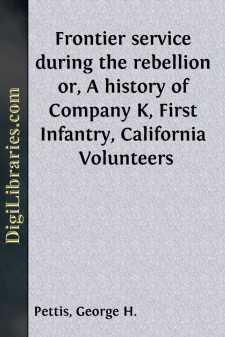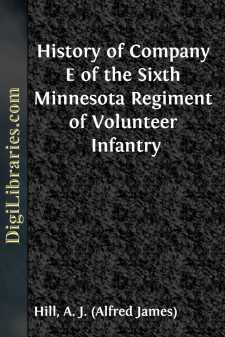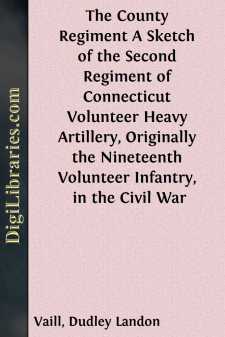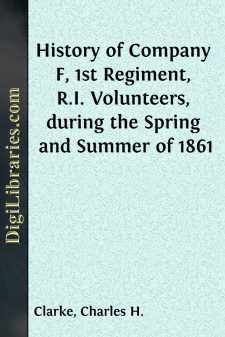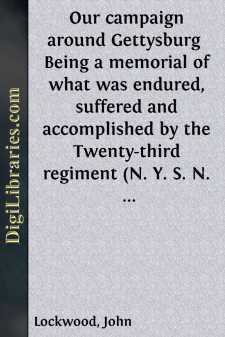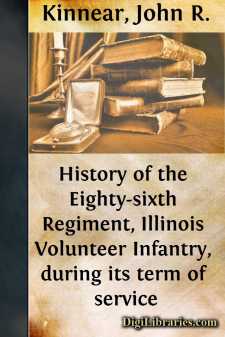History
- Africa 30
- Americas (North Central South West Indies) 50
- Ancient 68
- Asia 58
- Australia & New Zealand 8
- Canada 41
- Caribbean & West Indies 1
- Civilization 20
- Eastern Europe 12
- Europe 310
- Expeditions & Discoveries 60
- General 77
- Historical Geography 1
- Jewish 9
- Latin America 3
- Medieval 8
- Middle East 13
- Military 248
- Revolutionary 8
- Study & Teaching 5
- United States 353
- Western Europe 56
- World 13
History Books
Sort by:
PREFACE. Comrades of Battery A:—The time for the fulfilment of my promise to you, has arrived. The days of our trials, hardships and sufferings are past, and it but remains to memorize the period during which we were battling for the sacred cause of the Union. Although we have not seen the closing contest of this sanguinary strife, yet I feel confident that we have done our share towards securing a...
more...
by:
Carlton McCarthy
CHAPTER I. A VOICE FROM THE RANKS.—INTRODUCTORY. We are familiar with the names and deeds of the "generals," from the commander-in-chief down to the almost innumerable brigadiers, and we are all more or less ignorant of the habits and characteristics of the individuals who composed the rank and file of the "grand armies" of 1861-65. As time rolls on, the historian, condensing matters,...
more...
by:
George H. Pettis
The first battle of Bull Run had been fought. The government had become satisfied that the slaveholder's rebellion was not to be put down with seventy-five thousand men. The Union people of the United States now fully realized that the rebels were to use every effort on their part towards the establishment of the Confederacy, and the men of the north, on their part, were ready to "mutually...
more...
ORIGIN AND ORGANIZATION—1862. In the spring of 1862 a sixth regiment of infantry had been called for from Minnesota by the Governor of the State, but, from various causes, the enlistments proceeded very languidly till the disasters of the Virginian armies in the summer and the consequent proclamations of the President of the United States for volunteers gave an immense impulse to recruiting. Under...
more...
The history of the Nineteenth Army Corps, like that of by far the greater number of the organizations of like character, in which were arrayed the great armies of volunteers that took up arms to maintain the Union, is properly the history of all the troops that at any time belonged to the corps or served within its geographical limits. To be complete, then, the narrative my comrades have asked me to...
more...
PREFATORY For those who dwell within its borders, or whose ancestral roots are bedded among its hills, the claims of Litchfield County to distinction are many and of many kinds. In these latter days it has become notable as the home of certain organizations of unique character and high purpose, which flourish under circumstances highly exceptional, and certainly no less highly appreciated. It is as...
more...
CHAPTER I. CALL TO ARMS. Early in the month of April, 1861, several of the Southern States having withdrawn from the Union, forts, arsenals and navy yards within the limits of those States were taken possession of by the Confederate forces. On the 12th of April, Fort Sumter, at Charleston, S. C., was fired upon, and after two days' bombardment by the rebels, commanded by General Beauregard, the...
more...
by:
John Lockwood
PREFACE. If any one, taking up this book casually, should wonder why it was written, it may suffice to observe that "Gettysburg" is probably destined to mark an Epoch of the Republic;—as being one of the very few decisive battles of the Great Rebellion. Accordingly, whosoever took any part in it may hope to share its immortality of glory. But, says one, the militia were not engaged in the...
more...
CHAPTER I. In accordance with the Proclamation of President Lincoln, calling out troops for three years, or during the war—which in future history will be better known as the great Southern Rebellion—a Regiment of Light Artillery was at once organized in this State, and the command given to Col. James Barnett, of Cleveland, than whom no person was more qualified for the position. For many years...
more...
by:
John R. Kinnear
CHAPTER I. ORGANIZATION, AND MARCH TO NASHVILLE—ABOUT NASHVILLE. The Eighty-sixth Regiment of Illinois Volunteer Infantry was organized at Peoria in the latter part of August, 1862. David D. Irons was made Colonel; David W. Magee, Lieutenant-Colonel; J. S. Bean, Major, and J. E. Prescott, Adjutant. On the 26th of August the captains of the several companies drew lots for the letters of their...
more...




